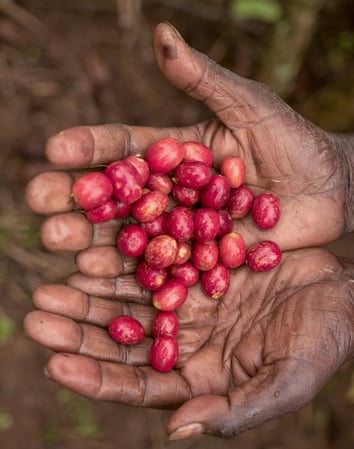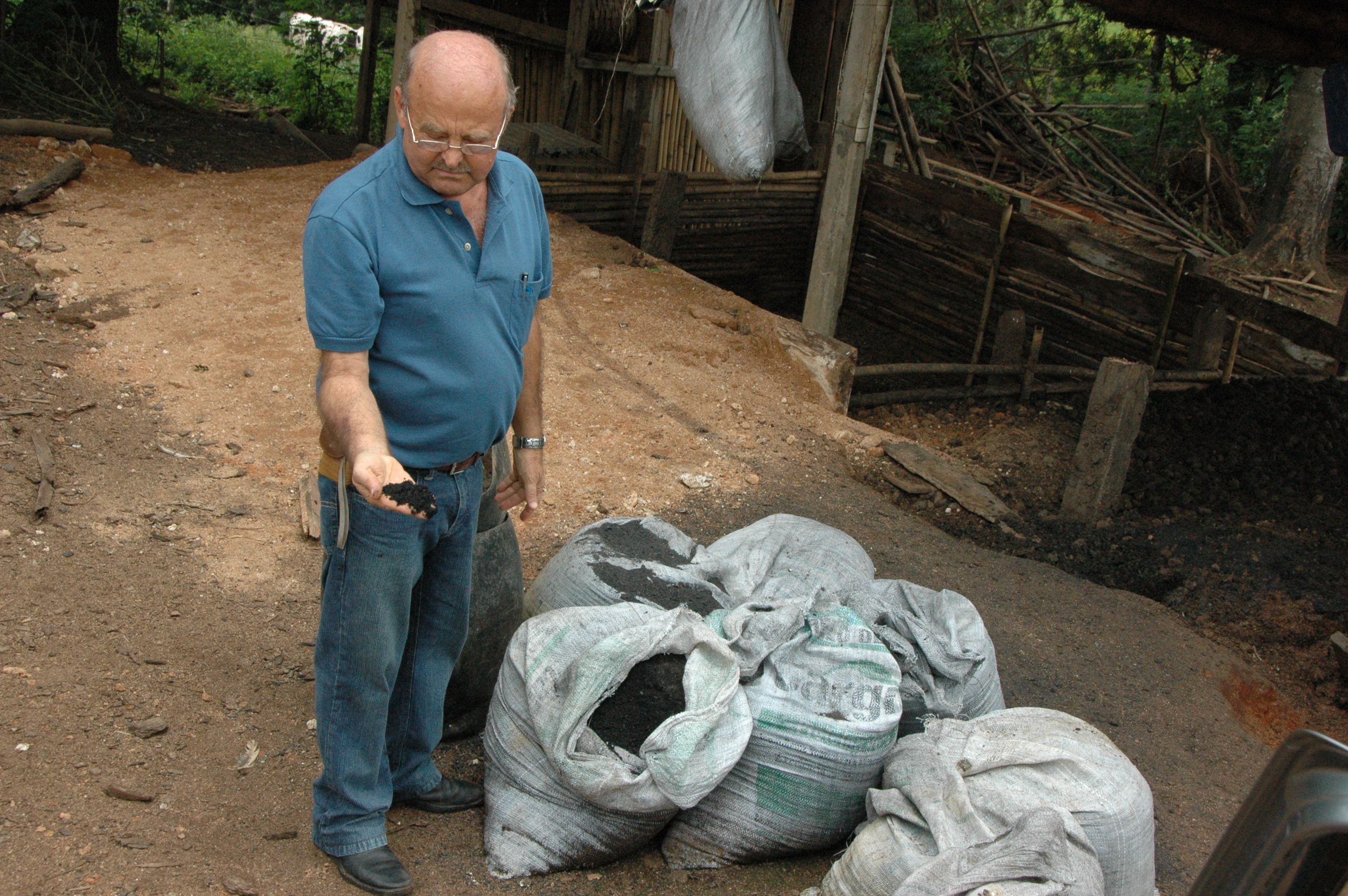Biochar Solutions: Carbon Credits, Coffee Yields, Producer Revenue, Less Fertilizer, Regenerative Agriculture, Climate Smart Agriculture, Compost Solutions, Coffee Waste Management,
Climateb2C is a new initiative to unite the carbon, biochar and coffee industries. We find technologies and partners to scale engineered biochar as a cost-effective solution for reducing greenhouse gas (GHG) emissions from global coffee.
Help coffee become the first net-zero commodity!
Coffee's Hidden Opportunity
Coffee is one of the world’s most traded commodities — and one of its most wasteful.
Every year, over 60 million metrics tons (130 billion pounds) of coffee cherry pulp waste are discarded, polluting waterways and releasing methane into the atmosphere.
Most farmers aren’t able to upcycle this rich resource, missing the chance to boost their incomes and create a positive environmental impact.
What if that waste could become a climate solution — improving soil health, supporting farmer livelihoods, and capturing carbon?
By turning coffee waste into biochar, the coffee industry can lead the way toward net-zero carbon emissions, protect natural ecosystems, and open up new income opportunities for coffee producers through carbon removal credits.

An ancient solution: modernized
Biochar
The solution is biochar, a pure, stable carbon created by heating organic matter (like coffee pulp) at very high temperatures (600 °C) in a low-oxygen environment. This isn't a new invention; indigenous Amazonian communities have used it for hundreds of years to create ultra-fertile "Terra Preta" soils.
It resembles granulated charcoal, but it’s used to store carbon and enhance soil health. When added to soil, biochar enhances fertility, retains water, and sequesters carbon, making it a tool for both mitigating climate change and promoting regenerative agriculture.
Today, farmers are using a range of machines, from artisanal to very modern technological pyrolyzers, to perfect this process.

Our Work
The Pathway Forward
ClimateB2C wants to support the coffee industry to reduce costs to growers, stabilize and improve yields, and help it become the world’s first net-zero agricultural commodity. To get there, the coffee biochar and carbon markets need greater transparency, and coffee producers and roasters need better information about these new opportunities.
Economic Impact
Biochar durable carbon credits are among the most valuable carbon credits, as they trade from $100 to $140 ton, compared to about $10 ton for conventional forestry carbon credits. Biochar represented over 90% of the durable carbon removal purchases in 2023, far outpacing other carbon removal technologies.
Soil Impact
Biochar has exceptional soil amendment properties. It can increase microbial nutrient availability, improve water retention, and help drier soils be more resilient. In recent field trials in Brazil, coffee yields increased by 38% while the fertilization dosage was reduced by half by using biochar in the soil.
Coffee and Biochar Projects



Partner with Us!
We work with coffee industry partners who want to better understand the challenges and opportunities of this technology. We plan to build coalitions to implement viable biochar projects.
We want to redirect the mountains of coffee by-products that can now be diverted from old waste streams and become new revenue streams for farmers.
We have been collaborating with faculty and students from Stanford University, Yale University, and Colorado State University to develop coffee-focused biochar system frameworks.
Let's talk!
Please fill out the form below and we'll talk about our partnership options!
Add a headline.
Lorem ipsum dolor amet food truck affogato cronut freegan skateboard photo booth, tousled pickled 90's wayfarers retro succulents hoodie edison bulb ramps. XOXO seitan tote bag, offal vape air plant disrupt chia plaid taxidermy cloud bread microdosing 8-bit.
About David
I spent years as a green coffee importer, focused on sourcing the world’s best organic and sustainable coffees. My work involved supplying coffee roasters with green coffee beans—the seeds inside the coffee cherry. I hardly thought about the coffee pulp around the seed that the farmers discarded.
I discovered that approximately 90% of the biomass from coffee berries is seen as a waste product by the producers. I've also learned that with the right technology, this waste could be converted into wealth for farmers.
While searching for ways to utilize all of the coffee berry, I’ve discovered innovative biochar solutions that turn coffee waste into a powerful resource for fighting climate change and building regenerative soils.
By working together as an industry—coffee producers, consumer brands, and stakeholder partners across their value chain—we can create new business partnerships that reduce our carbon footprint, increase our coffee yields, and help farmers earn more money.
I hope you will join us on this journey to make coffee a net positive industry!

Would you like to stay updated?
SubscribeJoin our mailing list
Please fill out the form below and we'll talk about our partnership options!
Add a headline.
Lorem ipsum dolor amet food truck affogato cronut freegan skateboard photo booth, tousled pickled 90's wayfarers retro succulents hoodie edison bulb ramps. XOXO seitan tote bag, offal vape air plant disrupt chia plaid taxidermy cloud bread microdosing 8-bit.
FAQs
-
What is biochar?
Biochar is a stable, carbon-rich material that resembles charcoal. It's made by heating organic waste in a low-oxygen environment through a process called pyrolysis. Unlike charcoal, which is used for fuel, biochar is used to improve soil and sequester carbon.
-
Is this a new or unproven technology?
The practice is ancient! Indigenous peoples in the Amazon created super-fertile "Terra Preta" soils with it thousands of years ago. What's new is the modern, highly efficient and clean technology (pyrolyzers) that allows us to produce it consistently and verifiably, making it eligible for the carbon market.
-
What is a "pyrolyzer"?
It's the machine that makes biochar. Think of it as a large, enclosed, high-temperature furnace or "clean reactor." It's designed to transform biomass into biochar without creating smoke or pollution.
-
How does biochar help the climate?
Plants absorb CO₂ from the atmosphere. When that plant matter decomposes, the CO₂ is released back into the air. Pyrolysis locks about 50% of that carbon into a solid, stable form. When you put that biochar in the soil, you are essentially burying that carbon for hundreds or thousands of years, removing it from the atmospheric cycle.
-
Can any farmer do this? Is it expensive?
While individual smallholder farmers might not be able to afford a pyrolyzer on their own, it's a perfect technology for coffee cooperatives or larger estates where cherry pulp is already being collected in one place. The sale of carbon credits is designed to help finance the investment in the equipment over time.
-
How do biochar carbon credits work?
The carbon market is a system where companies can pay to offset their emissions. Biochar is considered a "carbon removal" credit because it physically takes carbon out of the atmosphere. These are the highest quality, most in-demand credits because their impact is permanent and easily measurable. Our role is to help farmers navigate the complex verification process to be able to sell these credits.

